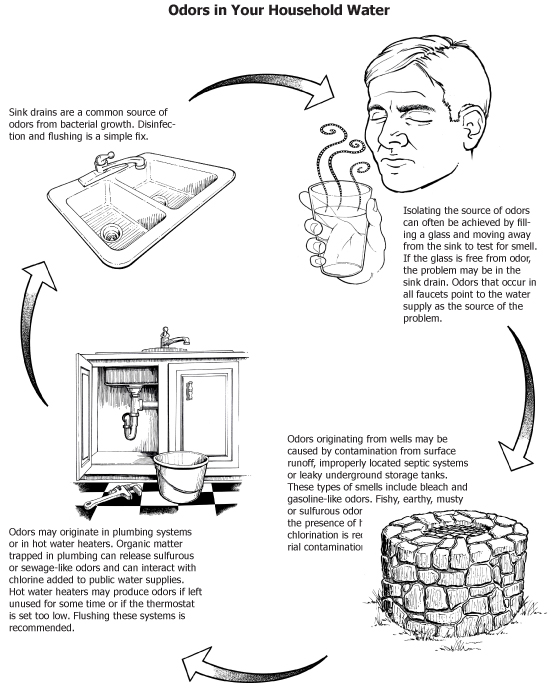Imagine walking into your home and being greeted by an unmistakable chlorine smell. It’s sharp, pervasive, and leaves you wondering what might be causing it.
This isn’t just a poolside aroma; it’s in your living space, and it can’t simply be ignored. Your mind races with possibilities—could it be a harmless spill, a cleaning product gone rogue, or something more concerning? This article is your go-to guide for unraveling the mystery behind the chlorine smell in your house.
We’ll explore the common culprits and delve into potential risks, so you can take the necessary steps to ensure your home remains a safe haven. Keep reading to uncover the surprising reasons behind this pungent scent and learn how to address it effectively, bringing peace of mind back to your sanctuary.
Common Sources Of Chlorine Smell
Chlorine smell in the house often comes from cleaning products, swimming pool water, or water supply systems. These sources can leave a distinct, sharp odor. Indoor air circulation can help reduce this smell.
If you’ve ever caught a whiff of chlorine in your house and wondered where it’s coming from, you’re not alone. The distinct smell of chlorine is often associated with cleanliness, but it can be quite puzzling when it lingers in your home unexpectedly. Understanding the common sources of this smell can help you identify and address the issue quickly. Let’s dive into the usual suspects that might be bringing that pool-like aroma indoors.Bleach And Cleaning Products
Bleach is a household staple for many, known for its powerful disinfecting properties. However, its strong chlorine smell can linger long after cleaning. If you’ve recently scrubbed your bathroom or kitchen, that distinctive scent may be the culprit.Cleaning products that contain chlorine-based ingredients can also leave a lasting odor. Ventilation can help, but sometimes the smell seems to hang around longer than you’d like. Next time you clean, try opening windows or using fans to disperse the smell more quickly.Water Treatment Chemicals
Tap water in your area might be treated with chlorine to ensure it’s safe to drink. This is a common practice, but sometimes the smell can be quite noticeable. Have you ever filled a glass of water and been surprised by a faint chlorine scent?This can be more prominent after a hot shower or when using water in an enclosed space. If the smell bothers you, consider using a water filter that removes chlorine. This can make a big difference in how your water tastes and smells.Swimming Pool Proximity
Living near a swimming pool can be a delightful perk, especially on hot summer days. But it might also be the source of that persistent chlorine smell. If your house is close to a pool, chlorine vapors can drift inside, especially if windows are open.Do you often find the smell strongest near windows or doors? Try keeping them closed when the pool is being treated with chemicals. This can help minimize the intrusion of the smell into your living space.Identifying the source of a chlorine smell in your home doesn’t have to be a mystery. By considering these common causes, you can take practical steps to reduce or eliminate the odor. What steps will you take next time you notice that unmistakable scent?
Credit: extension.uga.edu
Health Implications Of Chlorine Exposure
Smelling chlorine in your house might cause health issues like throat irritation, coughing, or eye discomfort. Prolonged exposure can lead to respiratory problems, affecting overall well-being. Reducing chlorine exposure is crucial for maintaining a healthy indoor environment.
Chlorine is a common household chemical. It is found in cleaning products and tap water. Its smell can be strong and unpleasant. Prolonged exposure can pose health risks. Understanding these risks is crucial for your safety.Respiratory Issues
Chlorine can irritate your respiratory system. Breathing it in may cause coughing. It can lead to shortness of breath. Asthma symptoms might worsen with chlorine exposure. Sensitive individuals should be extra cautious. Ventilate areas where chlorine is used.Skin Irritation
Chlorine can affect your skin. It may cause dryness or itching. Some people experience rashes. Chlorine exposure can make existing skin conditions worse. Avoid direct contact with chlorine. Wear gloves when handling products with chlorine.Long-term Effects
Long-term exposure to chlorine has potential risks. It may affect your lung function. Prolonged exposure can cause chronic breathing issues. Skin health might degrade over time. Awareness is key to minimizing these risks. Always ensure proper ventilation and protection. “`Identifying The Source Of The Smell
Discovering the source of a chlorine smell in the house involves checking common areas like bathrooms and kitchens. Inspect cleaning supplies and water sources, as they might be responsible for the odor. Ensure proper ventilation to help dissipate any lingering scent.
Identifying the Source of the SmellHave you ever walked into your home and been greeted by a strong chlorine smell? It can be unsettling and leave you wondering where it’s coming from. Identifying the source is key to addressing the issue effectively.Check Cleaning Supplies
Start by examining your cleaning supplies. Many household cleaners contain chlorine or bleach, which can leave a lingering scent. Check if any containers are open or leaking.A spill, even a small one, can create a noticeable odor. Consider switching to non-chlorine alternatives if the smell persists.Inspect Water Sources
Your home’s water sources can also contribute to a chlorine smell. If you notice the scent when running tap water, your municipal water supply might be heavily chlorinated.Contact your local water provider to confirm chlorine levels. Installing a water filter might help reduce the odor in your drinking water.Assess Pool Maintenance
If you have a pool, it can be a significant source of chlorine smell. Regular pool maintenance includes adding chlorine, which can evaporate into the air.Ensure your pool is covered when not in use to minimize evaporation. Check if your pool’s chlorine levels are higher than necessary, and adjust accordingly.Are you aware of other unexpected sources of chlorine smell in your home? Identifying them can help keep your living space fresh and inviting.
Credit: waterfilterguru.com
Preventing Chlorine Smell Indoors
Chlorine smell can be unpleasant and overwhelming indoors. It often originates from household cleaning products or treated water sources. Taking steps to prevent this smell is crucial for a comfortable living environment.
Addressing the root causes can make a significant difference. Simple actions can reduce or eliminate the chlorine odor in your home.
Proper Storage Of Chemicals
Storing chemicals correctly reduces chlorine odor. Keep cleaning products in cool, dry places. Avoid direct sunlight as it can intensify the smell. Ensure all containers are tightly sealed. This prevents leaks and minimizes exposure to the air. Label containers clearly for easy identification.
Ventilation Techniques
Ventilation plays a key role in reducing odors. Open windows to let fresh air circulate. Use exhaust fans in kitchens and bathrooms. These help remove lingering smells quickly. Consider installing air purifiers. They filter out pollutants and improve indoor air quality.
Water Filtration Systems
Using water filtration systems can help. They remove chlorine from tap water effectively. Choose a reliable system for your household needs. Regular maintenance ensures optimal performance. Check and replace filters as recommended. This keeps water tasting fresh and odor-free.
Effective Solutions To Eliminate Chlorine Smell
Finding an unexpected chlorine smell in your home can be quite alarming. It’s not only unpleasant but can also be a sign of underlying issues that need attention. Whether it’s coming from your water supply or cleaning products, tackling this odor effectively is crucial for maintaining a fresh environment. Let’s dive into some practical solutions that can help you eliminate the chlorine smell from your home.
Natural Odor Neutralizers
Using natural odor neutralizers can be a simple yet powerful way to combat chlorine smell. Consider placing bowls of baking soda or activated charcoal around the affected areas. These substances absorb odors rather than masking them. A friend of mine swears by her DIY lemon vinegar spray to refresh her kitchen. Have you tried incorporating essential oils like lavender or eucalyptus? They not only neutralize odors but also leave a pleasant fragrance.
Professional Cleaning Services
Sometimes, a deep clean is necessary to eliminate persistent chlorine smells. Professional cleaning services can offer specialized treatments that tackle stubborn odors. These experts have access to industrial-grade equipment and cleaning solutions that effectively remove chlorine traces. Have you ever considered hiring professionals for a yearly deep clean? It could be the solution your home needs.
Regular Maintenance Checks
Conducting regular maintenance checks is crucial in preventing chlorine smells. Inspect your plumbing systems and water heaters to ensure they are functioning properly. A small leak or malfunction could be the culprit of the odor. Ever thought about scheduling routine checks with a plumber? This proactive approach can catch issues early, saving you from surprise odors later.
Each of these solutions offers a unique approach to tackling chlorine smells in your home. Whether you prefer natural remedies, professional help, or regular maintenance, the key is to take action. What steps are you planning to take to ensure your home remains fresh and inviting?

Credit: www.simpurelife.com
Frequently Asked Questions
Why Does My House Smell Like Chlorine?
The smell might be from a pool, cleaning products, or water treatment. Check for leaks or spills.
Can Chlorine Smell Be Harmful At Home?
Yes, strong chlorine smell can irritate eyes, skin, and lungs. Ensure good ventilation and avoid prolonged exposure.
How Do I Eliminate Chlorine Smell Indoors?
Increase ventilation. Use air purifiers. Clean affected areas with vinegar or baking soda to neutralize odors.
Is Chlorine Used In Household Products?
Yes, chlorine is in bleach and some cleaning agents. Always use these products in well-ventilated areas.
Could My Tap Water Smell Like Chlorine?
Yes, municipal water may contain chlorine for disinfection. Use filters or let water sit to reduce smell.
Conclusion
Detecting a chlorine smell at home can be concerning. It signals potential issues. Check common sources like pools or cleaning products. Ventilate your home to reduce the odor. If the smell persists, seek professional help. They can identify hidden problems.
Regular maintenance helps prevent future issues. Keep your family safe with these simple steps. Understanding the cause is key. Address it promptly for peace of mind. Always prioritize health and safety. Stay informed and proactive. This ensures a fresh, safe living environment.
Remember, knowledge empowers you to act effectively.
